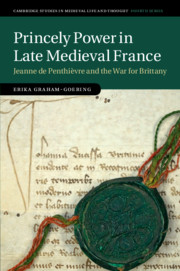Book contents
- Frontmatter
- Dedication
- Contents
- Illustrations, Maps, and Tables
- Acknowledgements
- A Note on Names
- Abbreviations
- Introduction
- 1 The Career of Jeanne de Penthièvre
- 2 Concepts of power in Jeanne de Penthièvre’s acta
- 3 Managing Property: Inheritance and Seigneurial Partnerships
- 4 Managing People: Followers and Service
- 5 Managing Order: Conflict, Negotiation, and Women as Lords
- 6 Debating the Social Context of Princely Power in 1341
- 7 Legitimate Rule and the Balance of Power
- Conclusion
- Bibliography
- Index
3 - Managing Property: Inheritance and Seigneurial Partnerships
Published online by Cambridge University Press: 31 March 2020
- Frontmatter
- Dedication
- Contents
- Illustrations, Maps, and Tables
- Acknowledgements
- A Note on Names
- Abbreviations
- Introduction
- 1 The Career of Jeanne de Penthièvre
- 2 Concepts of power in Jeanne de Penthièvre’s acta
- 3 Managing Property: Inheritance and Seigneurial Partnerships
- 4 Managing People: Followers and Service
- 5 Managing Order: Conflict, Negotiation, and Women as Lords
- 6 Debating the Social Context of Princely Power in 1341
- 7 Legitimate Rule and the Balance of Power
- Conclusion
- Bibliography
- Index
Summary
This chapter is the first of three to treat different aspects of Jeanne’s administration to assess how and why the balance of power could vary within a single ruling partnership. It examines the basic material foundations of lordship: land, inheritance, and money, including a survey of the financial challenges in Jeanne and Charles’ rule. It shows that coordination on significant matters was paired with the ability to act independently and more efficiently on lesser transactions. But these shared concerns did not erase distinctions between Jeanne and Charles’ personal responsibilities and status, which influences our understanding of why spousal co-rule functioned so readily in medieval society. Building on the centrality of inheritance within noble society, the chapter highlights two dynamics that enabled the distribution of power between spouses: the emphasis on lineage among the aristocracy, and the practices of divided succession and co-lordship that were prevalent across France, neither of which has been sufficiently studied in relation to co-ruling couples. By reconciling competing ideals of unitary and multiple lordship, these partible seigneurial standards offer an alternative or supplemental framework for contextualizing such ruling partnerships beyond the delegations of authority stressed in studies of monarchy in this period.
- Type
- Chapter
- Information
- Princely Power in Late Medieval FranceJeanne de Penthièvre and the War for Brittany, pp. 100 - 129Publisher: Cambridge University PressPrint publication year: 2020



